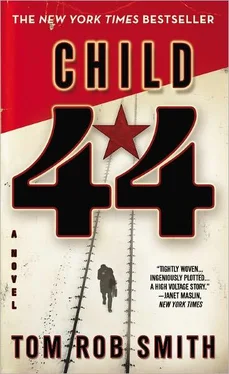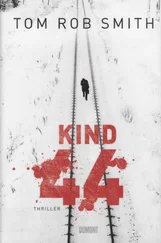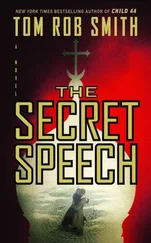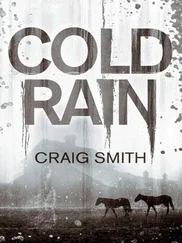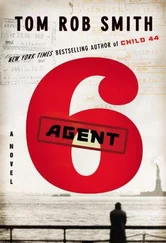Vasili stood, trembling with anticipation as he watched the preparations. Hvostov injected Leo with the oil. Seconds passed by, suddenly Leo’s eyes rolled back in his head. His body began to shake. It was the moment Vasili had dreamt of, a moment he’d planned in his head a thousand times. Leo looked ridiculous, weak and pathetic.
They waited for the more extreme physical reactions to calm down. Hvostov nodded, approving.
— See what he says.
Vasili stepped forward and untied the rubber gag. Leo vomited gobs of saliva onto his lap. His head fell forward, slack.
— As before, ask simple questions to start off with.
— What is your name?
Leo’s head rolled from side to side, more saliva dribbled from his mouth.
— What is your name?
No reply.
— What is your name?
Leo’s lips moved. He said something but Vasili couldn’t hear. He moved closer:
— What is your name?
His eyes seemed to focus — he looked straight ahead and said:
— Pavel.
Same Day
What is your name? Pavel.
Opening his eyes he saw that he was standing ankle deep in snow, in the middle of a forest, a bright moon above him. His jacket was made of coarse grain sacks, stitched together with care, as though made of the finest leather. He lifted one foot out of the snow. He wasn’t wearing shoes; instead, wrapped around each foot were rags and a strip of rubber, tied together with string. His hands were the hands of a child.
Feeling a tug on his jacket he turned around. Standing behind him was a young boy dressed in the same kind of coarse sacks. On his feet were the same kind of strips of rubber and rags tied together. The boy was squinting. Snot ran down from his nose. What was his name? Clumsy and devoted and silly — his name was Andrei.
Behind him a scrawny black-and-white cat began to screech, struggling in the snow, tormented by some unseen force. It was being pulled into the forest. There was string around the cat’s paw. Someone was tugging the string, dragging it across the snow. Pavel ran after it. But the cat, still struggling, was being pulled faster and faster. Pavel increased his pace. Looking back he saw that Andrei, unable to keep up, was being left behind.
Suddenly he came to a stop. Standing in front of him, holding the end of the string, was Stepan, his father, not as a young man but as an elderly man, the man he’d said goodbye to in Moscow. Stepan picked up the cat, snapped its neck and dropped it into a large grain sack. Pavel walked up to him.
— Father?
— I’m not your father.
Opening his eyes, he found himself inside the grain sack, his head caked in blood, his mouth as dry as ash. He was being carried, bouncing against a grown man’s back. His head hurt so much he felt sick. There was something underneath him. He reached down, touching the dead cat. Exhausted, he closed his eyes.
Feeling the heat of a fire, he awoke. He was no longer in a sack; he’d been emptied onto the mud floor of a farmhouse. Stepan — now a young man, the man in the woods, gaunt and fierce — was sitting beside the fire holding the body of a young boy. Beside him was Anna: she was young again too. The boy in Stepan’s arms was part human, part ghost, part skeleton — his skin was loose; his bones protruding, his eyes enormous. Stepan and Anna were crying. Anna stroked the dead boy’s hair and finally Stepan whispered the boy’s name.
— Leo.
This dead boy had been Leo Stepanovich.
Finally Anna turned around, her eyes red, and asked.
— What is your name?
He didn’t reply. He didn’t know his name.
— Where do you live?
Yet again he didn’t know.
— What is your father’s name?
His mind was blank.
— Could you find your way home?
He didn’t know where home was. Anna continued:
— Do you understand why you are here?
He shook his head.
— You were to die, so that he might live. Do you understand?
He did not. She said:
— But our son cannot be saved. He died while my husband was hunting. Since he is dead, you’re free to go.
Free to go where? He didn’t know where he was. He didn’t know where he’d come from. He didn’t know anything about himself. His mind was empty.
Anna stood up, walking towards him, offering her hand. He struggled to his feet, weak and dizzy. How long had he been in that sack? How far had he been carried? It had felt like days. If he didn’t eat soon he’d die. She gave him a cup of warm water. The first sip made him feel sick, but the second was better. She took him outside where they sat, wrapped up together under several blankets. Exhausted, he fell asleep against her shoulder. When he awoke Stepan had come outside.
— It’s ready.
Entering the farmhouse, the boy’s body was gone. On the fire was a large pot, a bubbling stew. Guided by Anna he sat down close to the heat, accepting the bowl which Stepan filled to the brim. He stared down at the steaming broth: crushed acorns floated on the surface alongside bright white knuckles and strips of flesh. Stepan and Anna watched him. Stepan said:
— You were to die, so that our son might live. Since he has died, you can live.
They were offering their own flesh and blood. They were offering their son. He raised the broth to his nose. He hadn’t eaten for so long that he began to salivate. Instinct took over and he reached in.
Stepan explained.
— Tomorrow we begin our journey to Moscow. We cannot survive here any longer. I have an uncle in the city, he could help us. This was to be our last meal before our journey. This meal was to get us to the city. You can come with us. Or you can stay here and try and find your own way home.
Should he stay here, with no idea of his identity, no idea of where he was? What if he never remembered? What if nothing came back to him? Who would look after him? What would he do? Or should he go with these people. They were kind. They had food. They had a plan, a way to survive.
— I want to come with you.
— You’re sure?
— Yes.
— My name is Stepan. My wife’s name is Anna. What is your name?
He couldn’t remember any names. Except for one, the name he’d heard earlier. Could he say that name? Would they be angry with him?
— My name is Leo.
11 July
Raisa was shunted forward towards a line of tables, each manned by two officers, one seated checking a stack of documentation while the other frisked the prisoner. No distinctions were made between men and women: they were all searched together, side by side in the same rough fashion. There was no way of knowing which table held your particular documentation. Raisa was pushed to one table, waved to another. She’d been processed so quickly that her paperwork hadn’t caught up. Something of an irritation, she was taken aside by the guard accompanying her, the only prisoner with her own escort, bypassing this initial part of the process. These missing papers contained the statement of her crime and her sentence. All around prisoners listened blankly as they were told they were guilty of AKA, KRRD, PSh, SVPsh, KRM, SOE or SVE, indecipherable codes which determined the rest of their lives. Sentences were thrown out with professional indifference:
Five years! Ten years! Twenty-five years!
But she had to excuse these guards their callousness — they were overworked, they had so many people to deal with, so many prisoners to process. As they called out the sentences she observed the same reaction from almost every prisoner: disbelief. Was any of this real? It felt dreamlike, as though they’d been plucked out of the real world and thrown inside an entirely new world where no one was sure of the rules. What laws governed this place? What did people eat? Were they allowed to wash? What did they wear? Did they have any rights? They were newborn with no one to protect them and no one to teach them the rules.
Читать дальше
